Ability in Disability
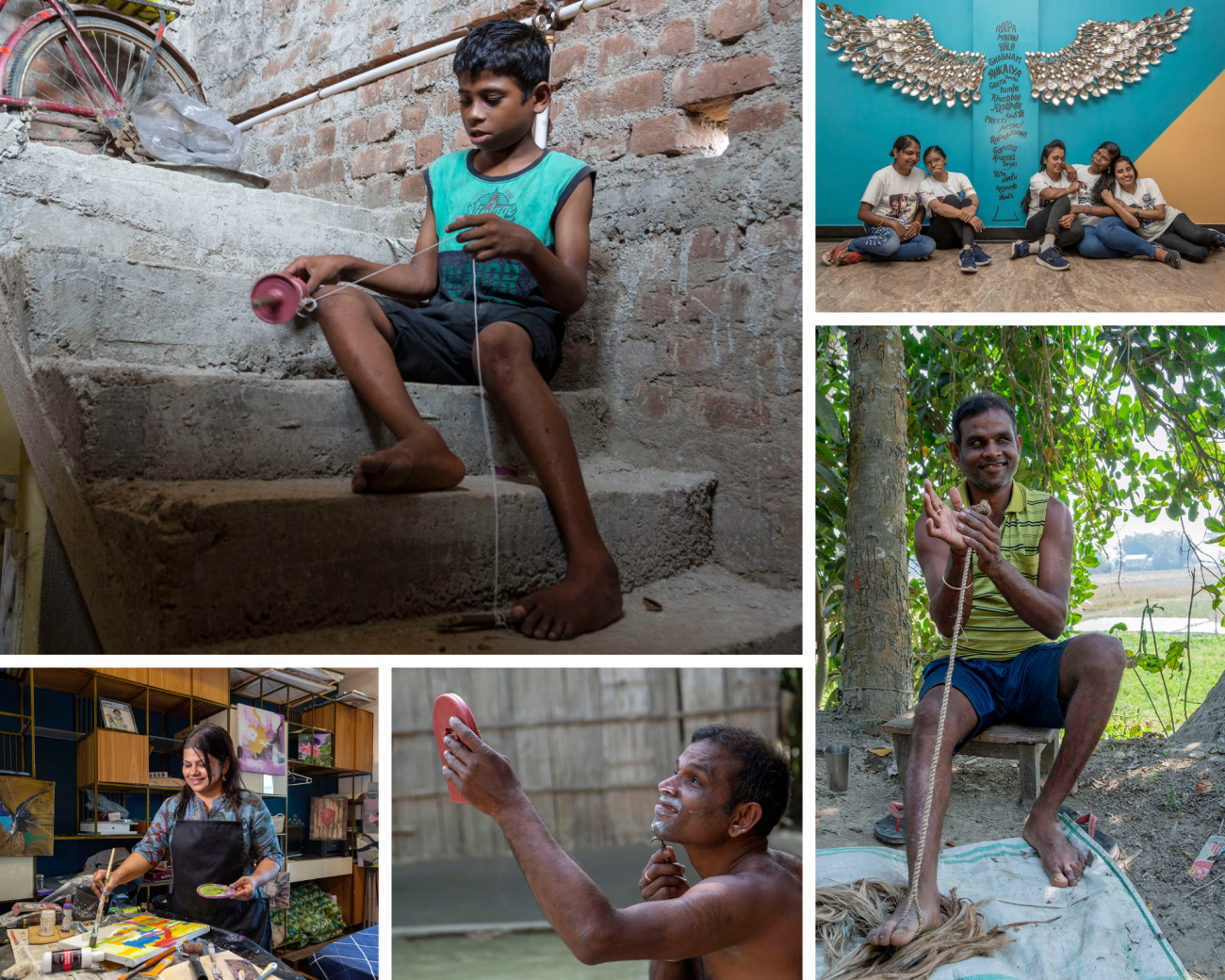
The photo stories, “Everyone is Good at Something” aims to feature stories of People with Disabilities and bring about a more inclusive society.
The photo series titled "Ability in Disability” aligns with this year’s International Day of Persons with Disabilities theme, ‘United in action to rescue and achieve the SDGs for, with and by persons with disabilities’. The exhibit showcases 21 impactful narratives from the 'Everyone is Good at Something’ Campaign shedding light on the challenges and triumphs experienced by People with Disabilities across every Indian state and union territory, encompassing all 21 disabilities recognized under the Rights of Persons with Disabilities (RPwD) Act of 2016.
Emphasizing on the individual rather than the disability, these photos illuminate the struggles and victories of relatively less-known persons with disabilities. Through the compelling portrayal of their daily lives, EGS aims to raise awareness about disability among the broader public, challenge preconceived notions and biases, and foster a more inclusive society that embraces diversity.
Aman Kumar Mahto,14 years
“I play with ball in school. Sometimes my mother makes my favourite chicken drumstick and aloo paratha”. Aman faces challenges in articulating his thoughts due to a speech impairment, but his mother, Sanu Devi adeptly deciphers his somewhat incoherent words when posed with questions. He says he likes school because he can play ball there, and that his classmate stole some of his tiffin! He loves chicken legs, instant noodles and aloo paratha.
Aman, who has an intellectual disability**, is in Class 1 of the special school at the Deepshikha Institute of Child Development and Mental Health in Ranchi, Jharkhand. His mother Sanu Devi (33), a domestic worker, drops him off and picks him up from the school bus stop, 13 km from their home in Pithoria.
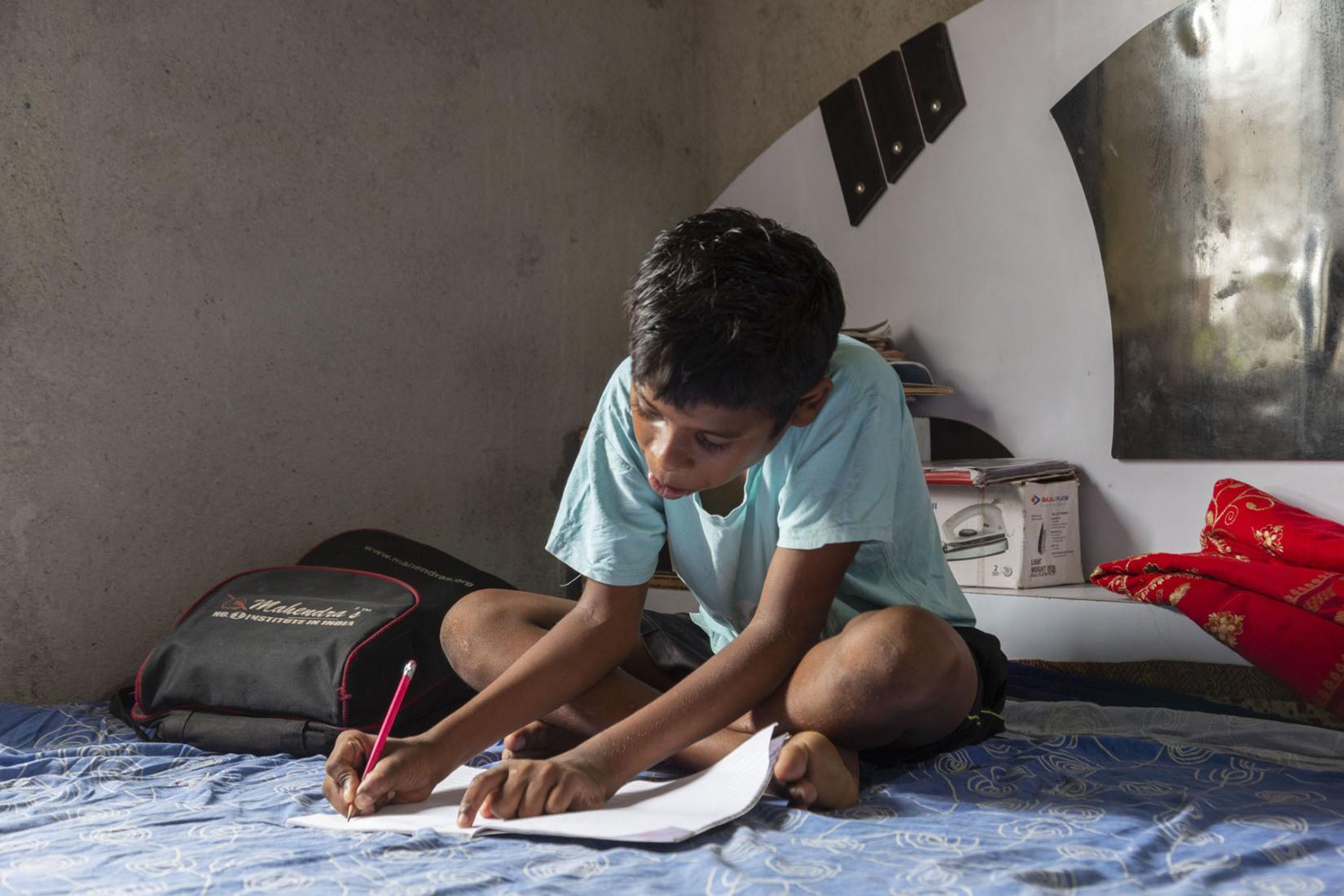
Aman expresses his fondness for school, citing the enjoyment of playing ball and revealing a humorous incident where a classmate pilfered some of his lunch. His culinary preferences include a love for chicken legs, instant noodles, and aloo paratha.
Sanu's life has been marked by hardship, particularly after being widowed at the age of 24. Constant harassment from her in-laws, possibly stemming from her background in a landless family, led to her eviction from their house. Struggling as a daily wage earner, her husband Mahesh succumbed to filariasis in 2012, a parasitic infection causing significant leg swelling. Sanu persevered with the support of her siblings, enduring periods of minimal or no meals while taking care of her two sons, Aman and Ankit (12 years). With a government grant and a private loan, she managed to build a home, and Aman's disability pension of Rs 1,000 lightens her financial burden and supports her childcare. Deepshikha Institute has also waived Aman's school fees.
Aman, engrossed in cartoons and mobile games, may not fully comprehend the sacrifices his mother makes to provide him with the cherished chicken dishes he craves.
Amir Hussain Lone
“I’ve never celebrated my birthday. One should celebrate each new day, since one never knows what life has in store.”
Amir Hussain Lone, a resident of Wagham village in Kashmir's Anantnag district, remains uncertain about his birth year, estimating it to be around 1989. However, he vividly recalls the fateful Sunday in 1997 when, as a young boy delivering lunch to his brother at his father's sawmill, a mechanical saw got entangled with his jacket, resulting in the loss of both his arms.
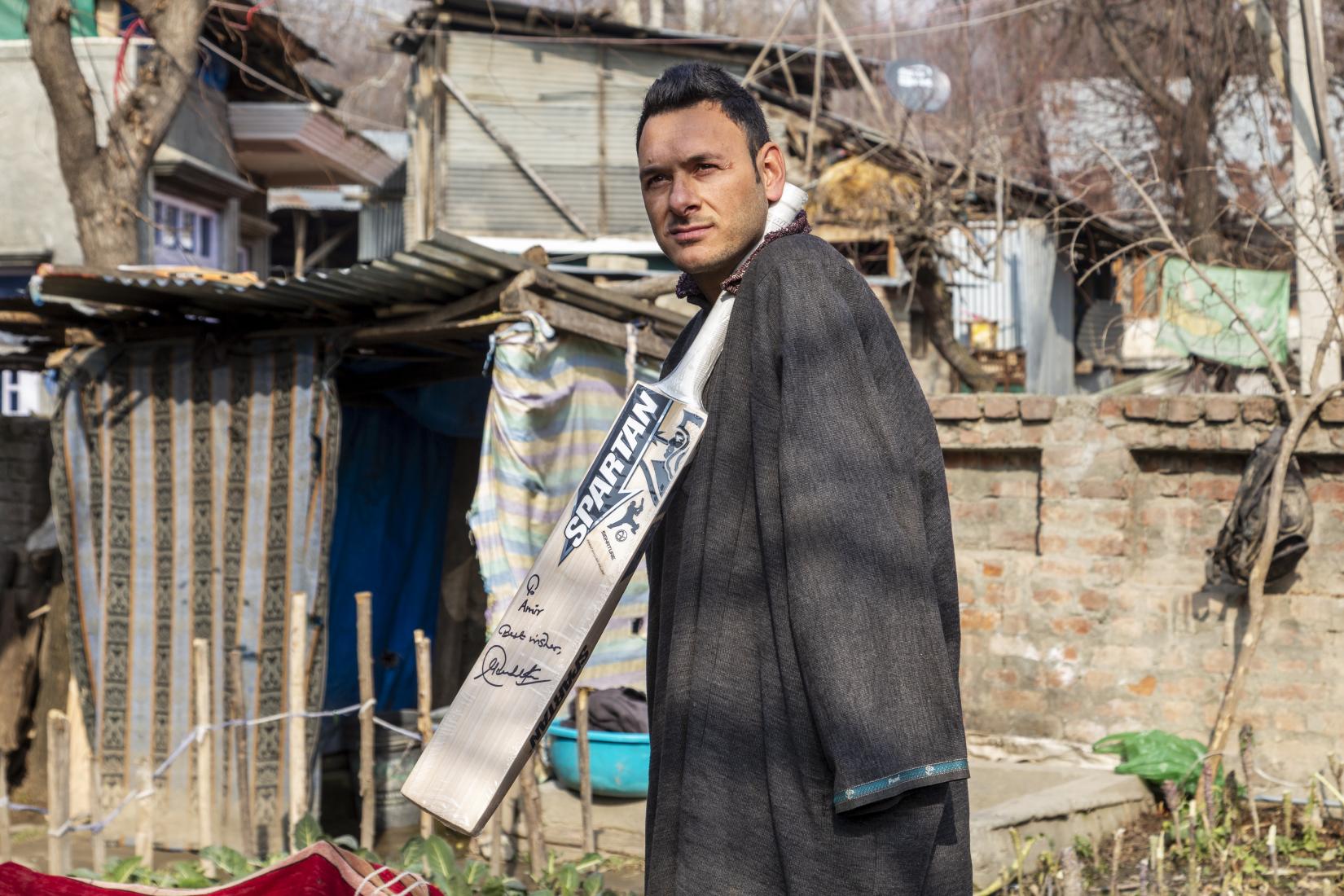
Amir narrates his life experiences with a clarity as if they transpired yesterday. He recounts how villagers abandoned him but it was a neighbour who sought help from the nearby army camp, and soldiers transported him to a hospital in Baramullah. The financial strain on his family led to the sale of their land to fund his treatment. Emerging from years in the hospital, Amir faced discouragement from villagers, who suggested injecting him with poison, deeming him worthless. However, his cherished grandmother, Fazee (who passed away in 2010), provided unwavering support, soothing his troubled mind and encouraging him to attend school in Marhama village.
Adapting gradually, Amir learned to use his feet for daily activities such as shaving, bathing, eating, drinking, and writing. Inspired by watching Sachin Tendulkar play on TV, he became a lifelong fan and took up cricket himself. Through hours of relentless practice, Amir mastered the art of bowling with two toes and batting by tucking the bat between his chin and shoulder. In 2016, he captained the J&K para cricket team, and in 2017, he received the Punjab Swabhimaan award.
At the time of this conversation, Amir was preparing for an upcoming match in Anantnag the following day. His most treasured possession is a bat signed by Sachin, and his ultimate dream is to meet his "guru."
Dr. Shanthipriya Siva, 50 years
“Enjoy your ups, and have the courage to face your downs”
Over the course of her life, Dr. Shanthipriya Siva (50), a resident of Chennai has taken on various roles – an ophthalmologist, an artist, an author, a model, and a motivational speaker. However, the role that has empowered her the most is that of being a Young-Onset Parkinson’s warrior.
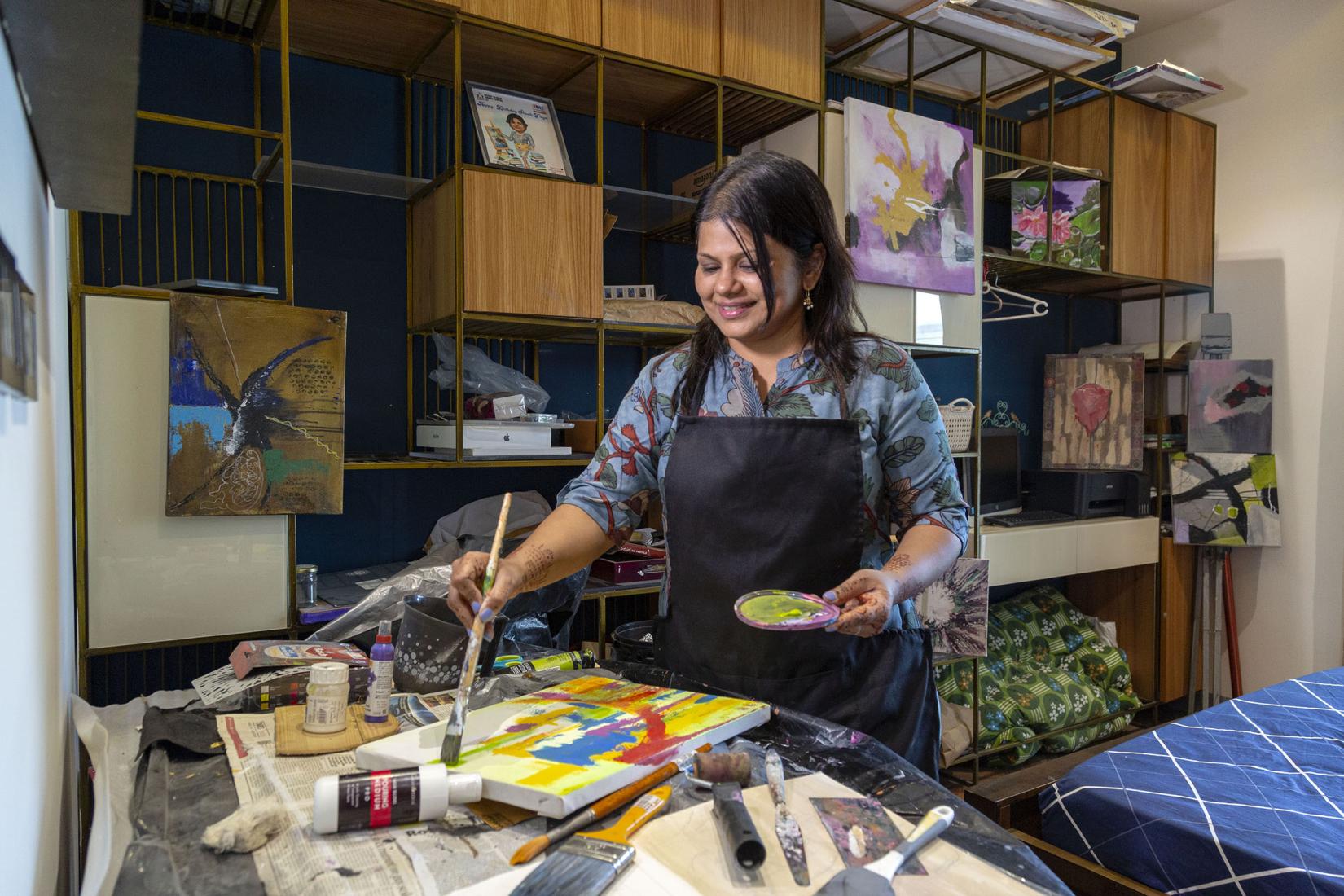
In the early months of 2010, Dr. Priya's husband, Dr. K. Siva (51), and her son, Dr. Khanishk (25), observed an unusual stiffness in her right arm while walking. Initially dismissing it as a gym-related sprain, she later faced the challenge of her right foot refusing to fit into her slipper. Seeking specialist opinions, neurologists confirmed Young-Onset Parkinson’s, an infrequent, progressive disorder occurring between the ages of 20 and 45.
Moving from denial to acceptance, Priya embarked on a journey to comprehend and manage the disease, determined to assist others facing similar struggles. In 2019, she relinquished her medical practice and established the SAAR Foundation to raise awareness and aid in managing Parkinson’s. Attending the 5th World Parkinson’s Congress in Kyoto, she delved into abstract artistry and underwent Deep Brain Stimulation (DBS) surgery.
DBS not only helped regulate symptoms and reduce medication but also triggered compulsive behavior. Priya began creating a new artwork every other day and commenced writing. Her painting, ‘Meraki,’ earned recognition at the London Art Biennale in July 2023. The previous year, she accomplished an inclusive trek up Kerala's Meesapulimala peak, the second-highest in the Western Ghats. Currently, Priya is working on her book, 'Living Well with Parkinson’s,' aiming to support individuals with Parkinson’s and their caregivers in coping with the challenges of the disease. “I don’t think that I’m disabled,” she asserts. “Parkinson’s has transformed me into an artist, an author. It has made me a better person.”
Shekhar Naik, 36 years
“Parents of visually impaired children should not hold them back. They should support their children by utilising the opportunities the government provides”
Growing up in Shivamogga, Karnataka, Shekhar Naik (36) faced exclusion from childhood games due to his blindness. However, he defied these early challenges to become an exceptional cricketer, ultimately earning the national award for his achievements.
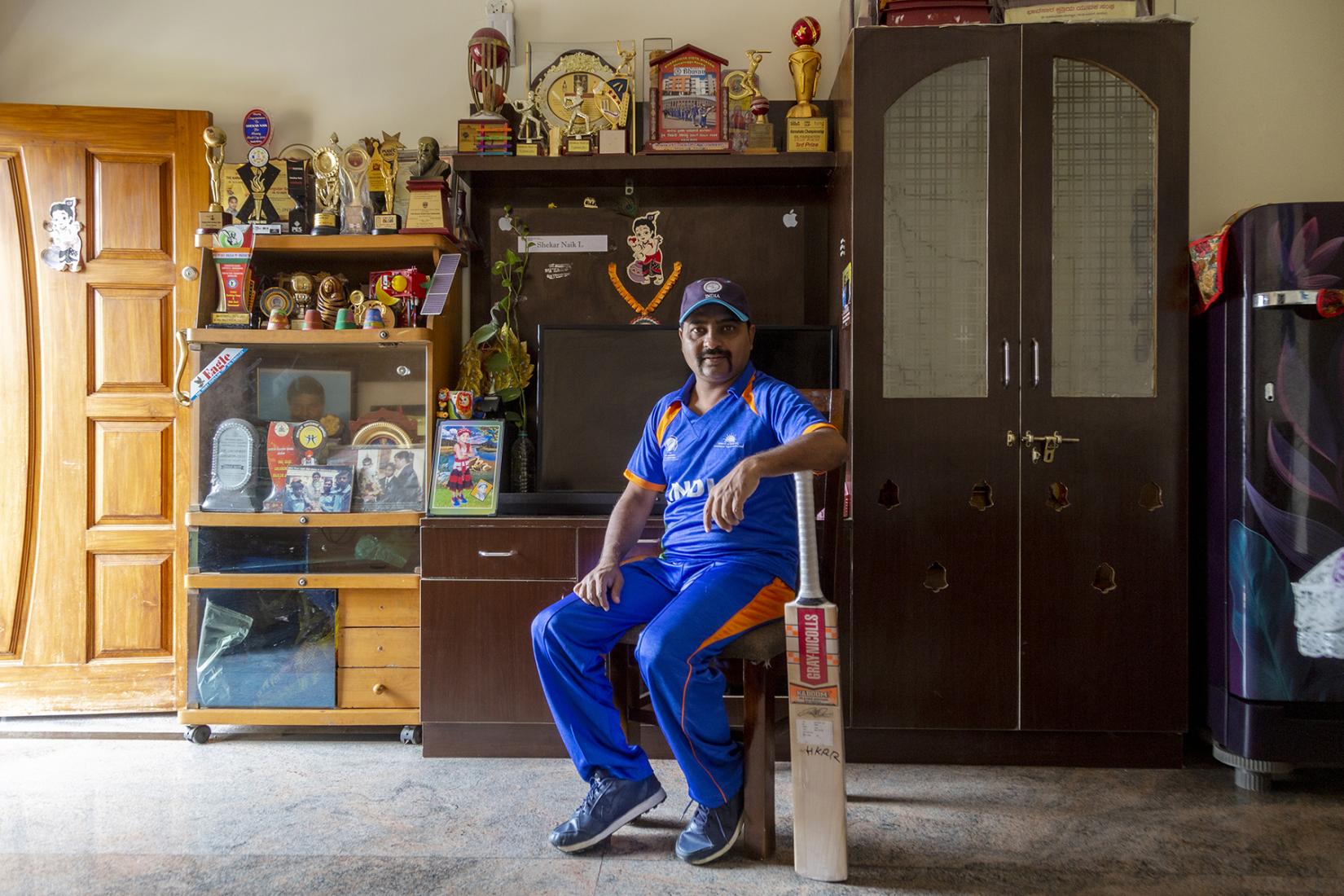
Hailing from an agricultural background, Shekhar's blindness was hereditary, with his mother Jamila Bai, her parents, and several other relatives also affected. At the age of eight, a fall prompted a visit to a health center, where the possibility of partial vision recovery was mentioned. Rushed to Bengaluru, Shekhar underwent an operation that granted 40 percent vision to his right eye.
Shekhar's education took place at Sri Sharada Devi Andhara Vikasa Kendra, a center for the blind providing free education and emphasizing sports and cultural activities. While mastering the veena and participating in Yakshagana, a traditional coastal Karnataka theatre form, cricket remained his primary passion. The Cricket Association for the Blind in India (CABI), an initiative of Samarthanam Trust for the Disabled, identified his talent. Shekhar's cricketing journey unfolded progressively – from the state blind cricket team to the national team, earning accolades such as 'Man of the Match' and 'Man of the Series,' captaining the Indian team, and ultimately receiving the prestigious Padma Shree award.
Shekhar tied the knot with Roopa K.C. while she was employed at Samarthanam, and they are parents to two daughters: Poorvika (12) and Sanvika (7). In 2019, he founded the Shekhar Naik Foundation to support budding blind cricketers. Despite the prospect of complete vision loss due to retinal pigmentation, Shekhar maintains, "Disability is not a weakness. It is one's strength."
The Sheroes
“Never look back. If you look back you will get stuck and you won’t be able to move forward”
The vibrant ambience of Sheroes’ Hangout Café mirrors the resilience of the women who operate it. Their T-shirts proudly proclaim, “My beauty is my smile,” while the back carries a powerful message: “Stop acid attacks.”
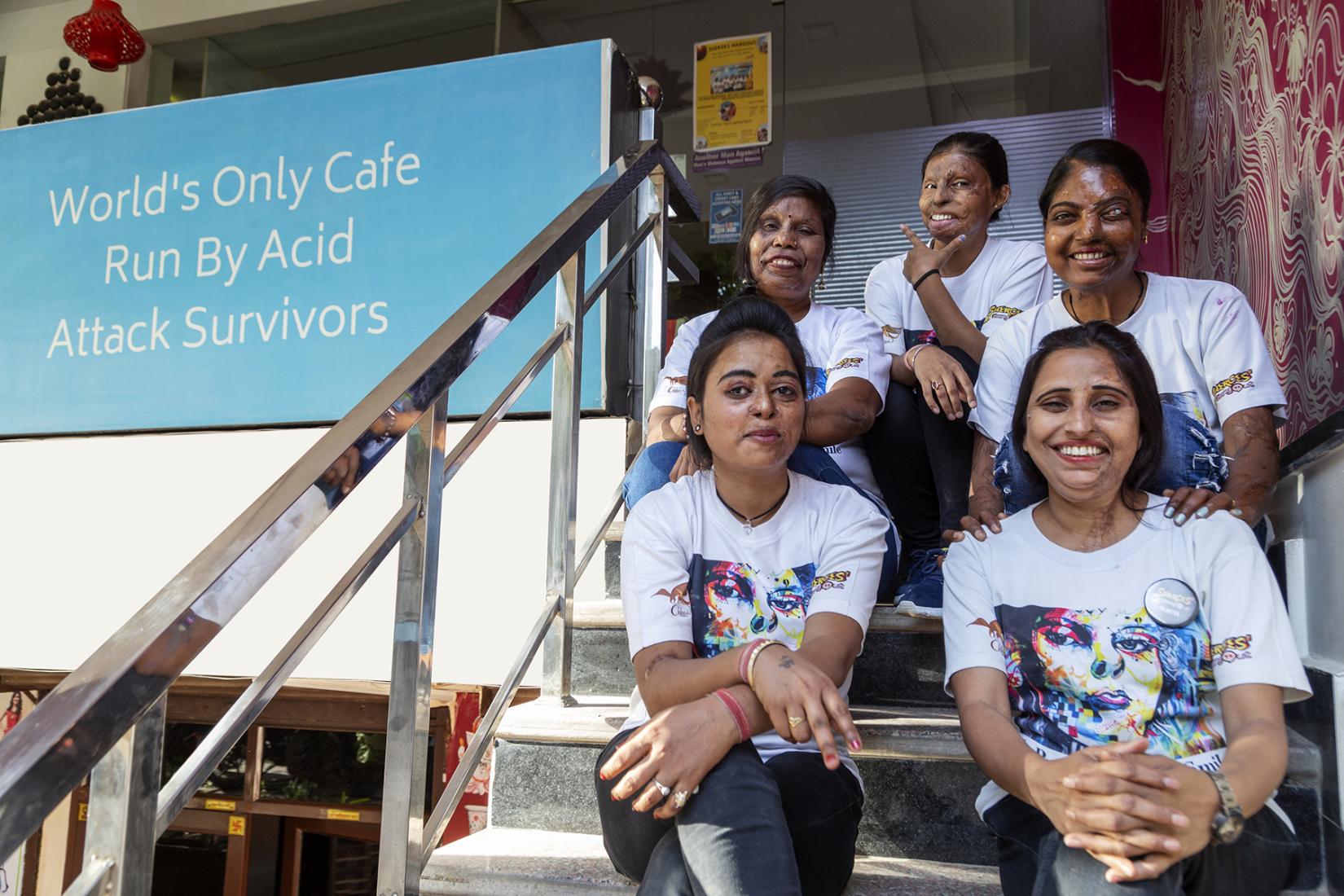
Among the ten female staff members, all of whom work in shifts, the five individuals we spoke to shared a common history of being attacked with acid during their teenage years, stemming from various tragic circumstances. Rukaiya Khathun (37) from Aligarh, who aspired to be a fashion designer, was attacked at 14 by her sister’s brother-in-law after she rejected his marriage proposal. Dolly (20), aspiring to become a doctor, endured an acid attack at the age of 13. Roopa (27) faced a similar fate at 14 when her stepmother poured acid on her face. Madhu (40) experienced an attack at 17 after rejecting a marriage proposal. Bala Prajapati (26) from Bijnor was attacked at 17 by a man seeking revenge after her mother spurned his advances.
Beyond the isolation and depression that marked their lives, most of these women received no justice or compensation, and the financial barrier to multiple plastic surgeries was insurmountable. The restaurant, initiated by Alok Dixit, founder of the Chhanv Foundation, provided them with a newfound purpose.
“I used to hide my face behind a burqa,” shares Rukaiya, “but now I am comfortable in jeans and a T-shirt.” She aspires to work in the café kitchen someday. Roopa dreams of designing and selling clothes online, while Dolly envisions opening a dance academy. Madhu, proficient in computer skills and fascinated with video editing (a skill acquired during the Foundation's training sessions in various disciplines amid the lockdown), has her own aspirations.
Bala captures the sentiment of all the Sheroes, stating, “Life does not stop just because our faces are scarred.”
For more stories, visit: www.everyoneisgoodatsomething.com
More about India Inclusion Foundation: https://indiainclusionsummit.com
To download these photos, visit: www.wephoto.in










